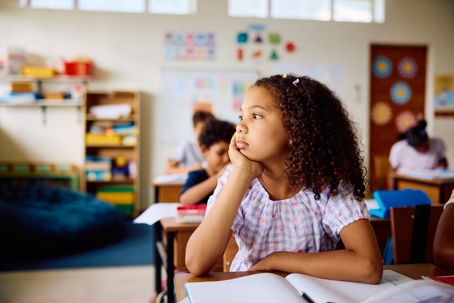Divorce is a difficult time for the whole family. Parents find it not just emotional, but hectic. Their time is split between court appearances, meetings with lawyers, gathering documents for the divorce, and sometimes making new living arrangements. During all the chaos, children sometimes get unintentionally put on the backburner leaving them feeling ignored and powerless. However, because they spend the majority of their time in school, the effects of the divorce is most often seen in the classroom.
The child's living arrangements during and after the divorce will make a big impact on their social and academic lives, especially if they must change schools. In the previous school, the child had friends in surroundings in which they felt safe and comfortable. In a new school, they will have to make new friends, as well as get used to a new teacher and new class routines while keeping the same grades they had made at the other school. They also may not be able to stay in touch with their old friends. They miss out on events they'd been looking forward to and find it difficult to continue participating in some extracurricular activities.
When the child enters the classroom every morning, whether it is in a new school or the school they had always attended, they will bring the emotions they've bottled up with them, such as confusion, fear, sadness, anger, and guilt. This may cause a change in the child's behavior. They may withdraw, be unable to focus, and lose the motivation to excel, causing a drop in grades. They may give up on academics entirely, refusing to do homework or participate in classroom activities. Their anger may cause them to bully other children or defy teachers.
Parents who cannot behave civilly when they are around the child can make matters worse. At home, they insult the other parent in front of them, using them as go-betweens for messages with information they have no business knowing, all of which adds to the guilt and anger that keeps the child from learning in school. By using the child as a form of revenge, some parent will not tell the other parent about special events being held at school. All that does is hurt the child because he/she didn’t have the both parents there to praise him/her. If a parent is unable to get the child to school on time, they would rather keep them home rather than call the other for help. This leads to chronic absenteeism, and even skipping class later, all making it difficult if not impossible for the child to catch up in class.
Parents can help their children get through the divorce and make school a safe, comfortable place in several ways:
- Make time to communicate – Talk to the child. Let them know it's alright to ask them any questions they have about the divorce or about how they feel about all the changes. This eases the feels of confusion and allows them to focus on their schoolwork. However, do not discuss court proceedings with the child. Those are adult things.
- Maintain a consistent routine – Parents are usually required to create a co-parenting plan during the divorce proceedings. Keeping a consistent routine should be one of the most important parts of that plan, including such things as scheduled study time and bedtime at both homes.
- Stay active in the child's school life – Keep interested in what the child is doing at school. Check their homework daily. Keep in touch with teachers to make sure the child is adjusting well to their new school and make sure there are no problems. Teachers see issues parents may not see.
- Seek professional help – Psychologists, counselors, or school counselors may be able to help the child deal with emotions they don't feel comfortable discussing with their parents. This would also help them focus on their classwork.
Some children are able to handle their parents’ divorce with little disruption. While each child is different, it's important to watch for any changes that could cause serious problems not just at school, but in all areas of their lives.

